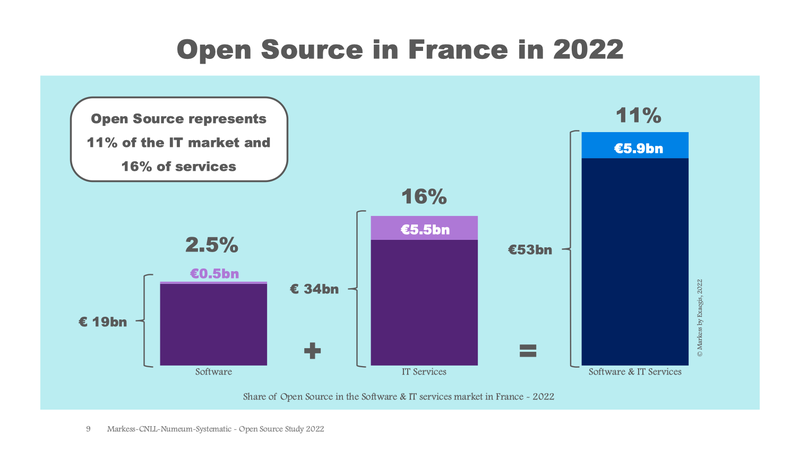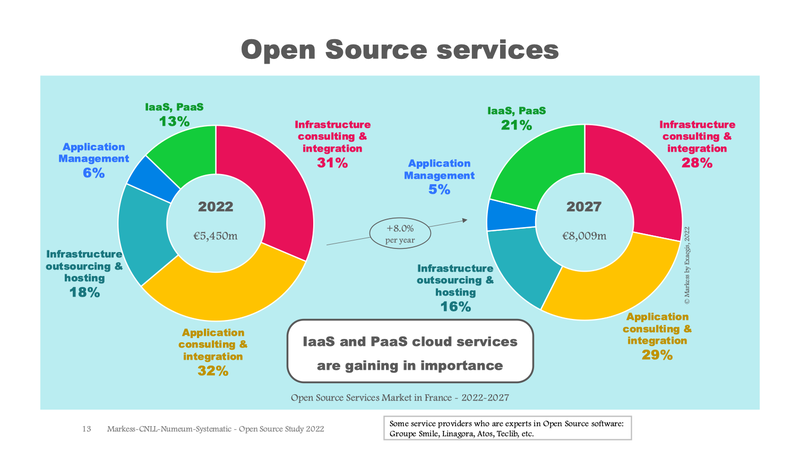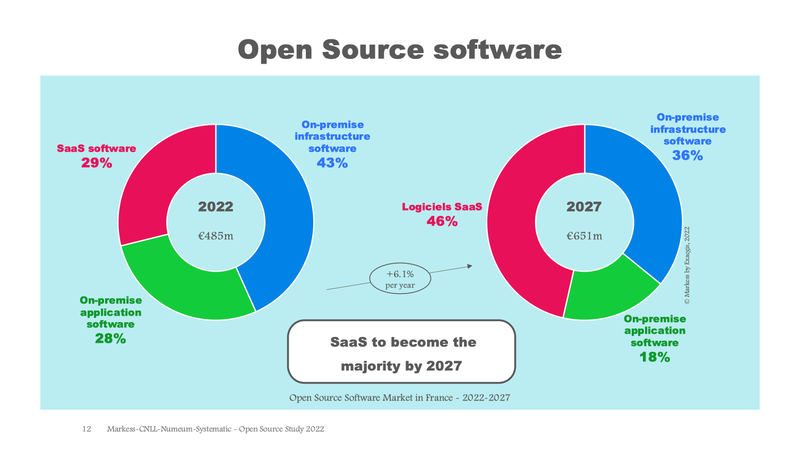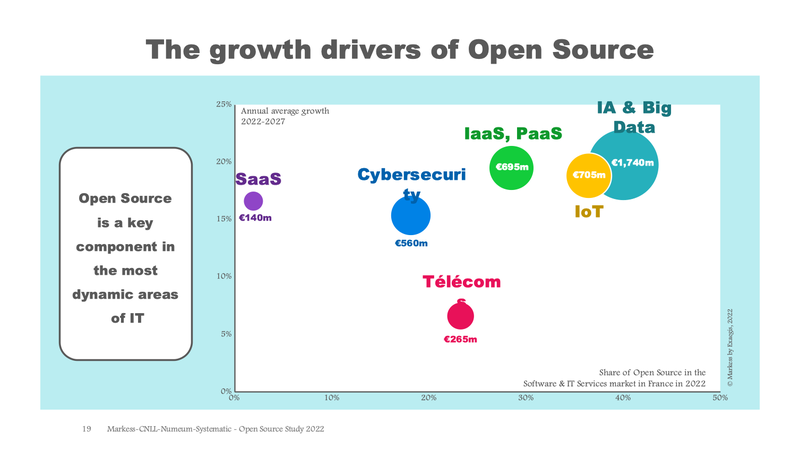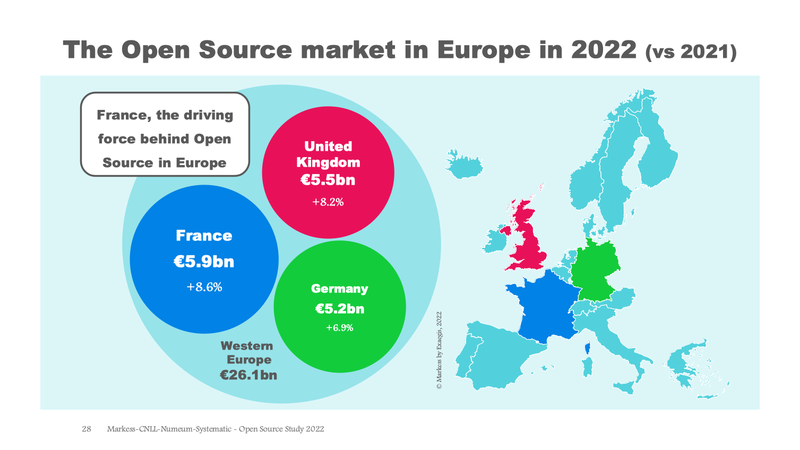2022 survey : The open source market in France & Europe.
- 29 novembre 2022
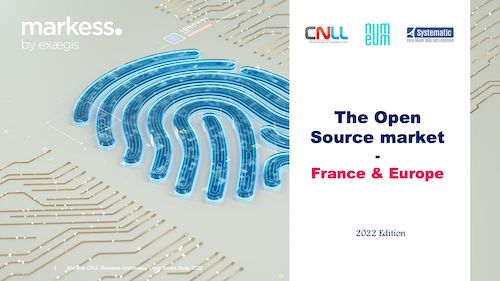
The open source market in France and in Europe in 2022
Open source is now making its mark on all innovative technologies and is becoming highly Europeanized.
- The open source software market in France has grown 40-fold in less than twenty years.
- Open source is a key component in the most dynamic areas of digital technology such as AI, Big Data, IoT, IaaS, PaaS, and cybersecurity.
- France is the locomotive of open source in Europe, with a market that represents €5.9 billion in turnover.
- The open source sector will recruit more than 26,000 people in France between now and 2027.
Paris, November 8, 2022 – For Immediate Release
The CNLL, Numeum and Systematic Paris-Region have commissioned MARKESS to carry out a study on the open source market in France and Europe, which aims to analyse the sector by identifying the main underlying trends since 2019 and anticipating its development up to 2027.
At the heart of the most dynamic areas of digital technology, open source software is continuing its progression, which began more than 20 years ago, and will represent a market of nearly 6 billion euros in France by 2022.
"Year after year, Open Source continues to grow, with a very encouraging outlook of nearly 8% per year between 2022 and 2027. This strong progression shows the growing influence of Open Source on the digital economy in France, as in Europe," says Marc Palazon, President of the Open Source Commission & Director of Numeum.
This progression is a long-term one. After having increased 40-fold in less than 20 years, the turnover of the open source sector in France should continue to grow faster than that of the overall digital software and services market over the next five years. France also confirms its European leadership, neck and neck with the German and UK markets.
For Philippe Montargès, President of the Open Source Hub of Systematic Paris-Region: "Open source is establishing itself as the quiet force in the digital sector. The growth of open source remains steady, and has been for over 20 years! France confirms its European leadership with almost 6 billion euros in revenues by 2022 and more than 60,000 direct jobs. This is good news, especially as this sustainable and positive dynamic is reflected in a strong increase in the penetration of open source software in many innovative technologies and solutions (Cybersecurity, Cloud Infrastructures, AI/Data, IoT, Telecom, SaaS...) and is spreading widely throughout Europe."
The study thus confirms the good overall dynamics of open source software in Europe. Open source is becoming more and more Europeanised by structuring itself around companies, communities and user organisations that make it the core of their development strategies. The main reasons for adopting open source remain cost savings and strategic leverage, but also, increasingly, ease of collaboration and skills development. The support of the European Commission, announced since the publication of the last study in 2019, is gradually being accompanied by the implementation of national policies in many member states, and is contributing to the dynamism of the open source sector.
This growth is also generating a massive recruitment need within the industry and the entire ecosystem, which will have to train and recruit more than 26,000 new full-time equivalents (FTEs) between now and 2027, who will join the ranks of the 64,000 employees who currently develop and integrate open source solutions. Developers, DevOps or marketing profiles, architects or business consultants: the need for open source skills is numerous and varied, as can be seen by browsing the recruitment sites.
Beyond training, it is a real industrial policy that must be defined and implemented, in France and in Europe, to take full advantage of the contribution of free software to innovation, technological independence and a more ethical and responsible digital environment.
"The companies in the sector have long been calling for an industrial policy to make it an asset in a strategy to regain European digital sovereignty. Among the measures we expect: a proactive purchasing policy from the public sector; dedicated funding that takes into account the specific economic models of open source software; pro-competitive measures that limit the ability of dominant players to lock in the market to the detriment of SMEs; strengthened requirements around open standards; a dedicated training policy," concludes Stéfane Fermigier, co-chair of the CNLL.
Download the market study (in English) Download the PDF
See the French version of this Press Release.
Illustrations:
